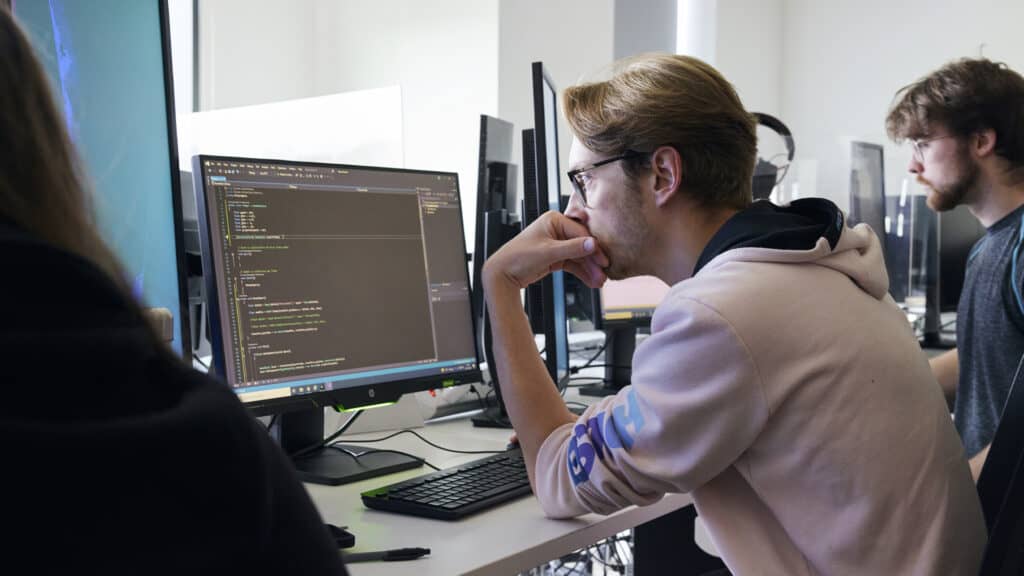Top 15
in the UK for academic support
National Student Survey 2024
Top 15
in the UK for assessment and feedback
National Student Survey 2024
9th
in the UK for course organisation and management
National Student Survey 2024
Join us at one of our Open Days!
Saturday 11 October
Sunday 26 October
Saturday 22 November
Saturday 11 October
Sunday 26 October
Saturday 22 November
Our next Open Day is in:
Overview
Gain an in-depth insight into the world of games design and development
Are you keen to work in the games industry but aren’t sure what you want to do yet? Our BA (Hons) Games Design and Development degree will help you choose your career path as you explore a range of roles, projects and opportunities within the video games industry.
Explore the complete creative process
Throughout the course, you will gain a comprehensive overview of the creative components in the game development process, as you develop all-round workflow skills and a clear understanding of the production pipeline.
Join our collaborative community
Throughout your degree, you will collaborate with students across the Department of Creative Industries to gain an exceptional understanding of production practices and technology application, enhancing your vital employability skills.
You will work with our award-winning 3D animation and VFX team and our BA (Hons) Esports course as you develop the core creative skills you will need in industry after you graduate.
Study areas include:
- Design concepts
- Programming
- Animation and VFX
- Production
- Narrative design
- Audio design
- Game theory
- Motion capture
Feel prepared for your future career
This course prepares you for a successful and fulfilling career within the rapidly-growing video games industry, as you engage directly with industry via games development companies and experts, and through masterclasses and mentoring.
You will develop your portfolio to meet current industry requirements, and gain a strong awareness of the needs of the industry as you hone your creative and technical skills.
On this course you will:
- Discover career opportunities across the games industry.
- Explore fundamental development disciplines including: design, programming, art and production.
- Explore specialist development areas including: audio, writing, motion capture, games theory and more.
- Become confident in the games production pipeline.
- Learn from award-winning industry professionals both within the University and beyond.
Find out more about our games design and animation courses
National Student Survey 2023
'Teaching on my course'
Learning opportunities
Overall average positivity
Partnerships
As a part of the Department of Creative Industries you will benefit from our industry partnerships with companies including HyperX, DXRacer, Twitch, ARRI and AVID, and be able to access to industry standard software such as Nuke, Maya and Houdini.






The Course
Develop your technical and creative skills in design, programming, art and production
Year One
In your first year, you will learn the fundamentals of games design and development, as you explore element of digital art construction, working with 3D engines and wider programming principles.
Year Two
Your second year continues to develop your programming and design skills, and provides you with options to explore wider aspects of the game development process, including writing for games, games studios, motion capture and 3D animation.
Year Three
In your third year, you will learn more advanced design and development techniques as you work towards your final major games design project.
You will also explore your future career options and develop an understanding of how best to prepare a strategy for employability, freelance work or start-up.
Modules
Select a year
Art and Visual Design: An Introduction
This module will introduce you to the basics of art theory, giving you the opportunity to create artistic work that demonstrates an application of these concepts.
You will investigate the foundations of art production through a series of projects that establish a fundamental understanding of visual communication.
Design Fundamentals
This module introduces you to the fundamentals of game design. You will learn about the foundational elements that comprise games and how these elements are used to create emotional player experiences.
Games Theory and Criticism
This course focuses on deconstructing theories from game studies and learning how to apply these concepts to practical games design work.
You will gain a critical vocabulary for analysing games both inside and outside of the classroom and a necessary theoretical foundation to draw on for future games design work or game analyses.
Introduction to 3D Art
This module serves as a foundation for developing a range of technical knowledge and procedural skills in the core concepts of 3D computer graphics using the appropriate industry-standard software.
Prototypes and Programming Principles
This module provides you with a fundamental level of knowledge and understanding of key prototyping and programming principles necessary for making rapid digital game prototypes.
Whether or not you have any prior programming experience, the module looks to bring you and your peers to a common level.
Working With 3D Engines
Throughout the course of this module, you will be introduced to an industry-standard 3D engine, learning about its core features and how it can be used to create digital games.
3D Animation for Games
This module introduces you to the fundamental principles of animation and provides an opportunity for you to familiarise yourself with animation in the context of games development.
Games Design Project
On this practical module you will work in small groups to produce a computer game concept. You will learn to work as a teams, break tasks apart, and deliver a Games Design Document (GDD) to a set deadline, reflecting industrial practices and presentation expectations.
Games Production
This module examines a range of topics pertaining to games production – exploring the elements a producer must manage to ensure a successful game launch.
This module explores the game development process outside of the typical creative disciplines studied (e.g. art, code, and design) – instead focusing on project management skills and processes that apply both to games but also to similar roles in other creative industries.
Games: Social & Cultural Contexts
This module explores the social, historical and political context surrounding videogames, debating topics relating to their cultural development and impact.
The module will further develop your critical engagement with games studies, providing you with further theoretical frameworks to draw upon in games development projects.
Motion Capture Suit Technologies
The aim of this module is to develop a significant body of knowledge of a typical film and multimedia motion capture pipeline, from setting up cameras and capturing data, through to editing and transferring data to industry standard animation packages. This module offers the opportunity to develop a range of professional technical and procedural knowledge.
Narrative Design and Interactive Fiction
This module develops your understanding of fundamental theories, pipelines and processes pertaining to narrative design in videogames.
You will then learn to apply these theories in practical exercises that mirror the responsibilities of writers working in the contemporary games industry.
During the module, you will have the opportunity to create a piece of interactive fiction using the tools and techniques taught.
Writing for Games
This module examines the role of the screenwriter in the development of narrative based computer games.
You will explore the role the screenwriter plays in developing characters, dialogue and worldbuilding.
You will also be introduced to the debates around narrative vs Ludology and the tensions created between story and play.
Audio and Music for Video Games
This practical module develops your creative and technical skills in sound design, music composition and basic audio implementation for video games.
You will explore the creation of a broad range of sound assets and audio related content, as well as on non-linear adaptive processes and structures.
You are also introduced to industry standard middleware that enables sound designers and composers to implement their assets in game.
In addition, whilst working with one of our industry partners, you will receive individual mentoring and feedback on your final assessment tasks.
Final Year Games Design Project
In this independent, project-driven module, you will have the opportunity to pursue your own enthusiasms and specialisms.
You will begin the module by pitching a game idea to a panel for feedback. You will then generate associated pre-production documentation that covers all the key aspects of their proposed game and will be continually updated through the development of the final year project. You are then expected to provide extensive ‘proof of concept’ for a commercially-viable computer game.
Games Industry and Creative Careers
This module aims to develop your understanding of the creative sector as an industry, becoming aware of key dynamics within the sector and specific expectations related to employability, especially within the games development sector.
These include
- Discipline-specific working practices
- Geographic spread
- Working structures
- Team working and inter-personal skills
- Freelancing and collaborative work
- Funding streams
- Developing portfolio /studio setup
- Taxation
- Regulation
- Law and ethics.
You will get the chance to consider which career pathways align with your own personal ambitions, and develop an understanding of how best to prepare a strategy for employability, freelance work or start-up.
Creative Portfolio
You will enhance your career prospects by producing creative artefacts that align your skills with your commercial and professional objectives.
The module aims to develop your transferable skills in balancing creative and strategic career objectives.
Motion Capture Face/Feature Tracking Technologies
The aim of this module is to develop a range of professional, technical and procedural knowledge and an understanding of the core concepts of optical motion capture in the context of the film, TV and gaming industry. It explores both software and hardware solutions and will explore rig setup, image capture and 2D/3D data processing.
Working With 3D Engines
Throughout the course of this module, you will be introduced to an industry-standard 3D engine, learning about its core features and how it can be used to create digital games.
Resilience and the Freelancer
This module serves as an introduction to the wide range of skills required for survival in the modern creative and media industries. Self-employment is increasingly considered the norm and this module will prepare the student for a freelance career.
Teaching and Assessment
Feel the support of our experienced and expert staff
Teaching
You will attend scheduled classes such as workshops, lectures and seminars, as well as spending some time studying independently.
Throughout your studies, you will use an iterative workflow that focuses on reworking and revisiting an idea to improve it. This workflow is used in industry and will help prepare you for your career after your graduate.
As well as working independently, you will work on some projects and seminars in groups, developing your communication and teamwork skills while creating work with other students.
Smaller class sizes to help your development
Our commitment to smaller class sizes allows you to feel more confident to discuss your ideas in a supportive environment and allows your tutors get to know you and how best to aid your development.
Meet programme coordinator Alan Stewart
Alan Stewart
Before joining Chichester, Alan worked in design roles for numerous studios across the UK. His most recent role was at a Brighton-based studio specialising in VR games and experiences where his work was nominated for an International VR Award.
When he’s not teaching, Alan can be found either tinkering in Unity or exploring his research interests in game-based learning.
He holds a master’s in digital games theory and design from Brunel University and is a Fellow of The Higher Education Academy.
Assessments
You will be assessed through a range of assignments, including:
- Creative projects
- Project work
- Creative portfolios
- Presentations
- Reflective writing.
Experience
Learn in our state-of-the-art Tech Park building
Discover our £35 million Tech Park
Our Bognor Regis campus boasts the £35m Tech Park and brings together science, technology, engineering, arts and mathematics courses on one state-of-the-art site.
Games development labs
Our dedicated games development labs have everything you need to succeed, with industry-standard computers and software.
Expert staff
Our industry-experienced staff get to know you and your learning needs to help you thrive.
Post-production facilities and recording studios
Discover our range of facilities for audio and visual media post-production.
Learning Resource Centre
The Learning Resource Centre (LRC) contains the library, a café, IT/teaching rooms and the Support and Information Zone (SIZ).
Library
Our campus library holds more than 200,000 books and over 500,000 eBooks.
Subject specific librarians
If you have difficulty finding material for an essay, seminar or project, subject librarians will be happy to provide assistance.

Sam
Careers
Graduate ready to make an impact on the games industry
Our BA (Hons) Games Design and Development degree will prepare you for a range of career options across this vibrant and fast-growing industry. You will graduate as a technically proficient creative who is ready to bring a range of abilities to the workplace.
Potential careers include:
- Games designer
- Level designer
- Producer
- QA tester
- Writer.
Further Study
You could choose to continue your studies to postgraduate level.
Postgraduate study options available at Chichester include:
- PGCE and Masters
- MA Screen Acting
- MA Composition for Film, TV and Games
- PhD research.
University of Chichester alumni who have completed a full undergraduate degree at the University will receive a 15% discount on their postgraduate fees.
Course Costs
Course Fees 2025/26
UK fee
International fee
EU/EEA Fee Reduction Scholarship
EU/EEA students automatically pay the equivalent of UK fees via the EU/EEA Fee Reduction Scholarship
For further details about fees, please see our Tuition Fees page.
For further details about international scholarships, please see our Scholarships page.
To find out about any additional costs on this course, please see our Additional Costs page.
Entry Requirements
Applying through Clearing
We know that you are so much more than your grades, which is why we take your aspirations, passion and personality into account. Through Clearing, we’re taking a flexible approach. Even if your grades are a little different from those advertised, please contact us – we’ll consider every application individually.
Typical offers (individual offers may vary):
UCAS
A Levels
BTEC/Cambridge Technical
Access to HE Diploma
IB
IELTS
Contextual offers
We believe everyone deserves an equal opportunity to pursue higher education, regardless of their background.
When we receive your application we consider your personal circumstances and the factors surrounding your achievements to see if you are eligible for a contextual offer. This is an offer with a reduced entry tariff – typically the equivalent of 16 fewer UCAS points (two A-level grades).
Find out more about our contextual offers.






